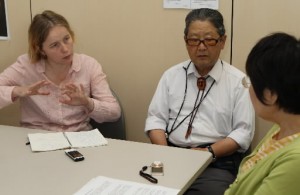British journalist compiling book of A-bombing accounts Began conducting interviews in 2012 Desire to convey story of Hiroshima’s recovery to England
Sep. 19, 2014
by Yuji Yamamoto, Staff Writer
Elizabeth Chappell, 41, a British journalist residing in London, arrived in Hiroshima early this month for a stay of about three weeks during which she is interviewing atomic bomb survivors about their experiences. She plans to compile these oral histories in a book to be published next year, which marks the 70th anniversary of the atomic bombing.
Ms. Chappell is conducting her interviews with the cooperation of various people, including Keiko Ogura, 77, an English-language interpreter who has talked about her A-bombing experiences both in Japan and abroad. On the day of this report, Ms. Chappell spent about 90 minutes interviewing Keisaburo Toyonaga, 78, an A-bomb survivor who has devoted his efforts to providing support for survivors living overseas.
Mr. Toyonaga told of being exposed to radiation after coming to Hiroshima to search for his mother and younger brother, who were working on the demolition of buildings for fire breaks when the atomic bomb was dropped. He also talked about hearing of Koreans who were not receiving aid and having scrambled to provide support to them. Ms. Chappell nodded as Mr. Toyonaga said, “They are victims just like the rest. There should not be discrimination against them.”
Ms. Chappell has worked at various jobs including as an editor for a publishing house in London. She is well-versed in Japanese literature and has written a travel book on Japan. When she first visited Hiroshima about five years ago she learned of the harsh experiences of the atomic bomb survivors and of the vitality of Hiroshima, which rose from the burned-out devastation of the atomic bombing to become a city of peace. With a desire to convey this story in England, she received a research grant in 2012 and began conducting interviews in Hiroshima. This is her fourth visit for that purpose.
Ms. Chappell takes seriously the words of one A-bomb survivor who said, “The atomic bomb completely destroyed everything. No matter how fully the city recovers, the culture, the work and the lives that were lost will never come back.” When she revisits survivors she has become acquainted with they sometimes start talking about feelings that they have never shared with anyone. Ms. Chappell tries to get a sense of what the survivors lost in the A-bombing and to make careful note of those things.
She is keenly aware that while her homeland possesses nuclear weapons, the British have little interest in or knowledge of the atomic bombing and its effects. She noted that while it is a fact that nuclear issues tend to put people off, many people can relate to the lives of the A-bomb survivors. She hopes that through her book the voices of the survivors will be etched into people’s memories.
(Originally published on September 15, 2014)
Elizabeth Chappell, 41, a British journalist residing in London, arrived in Hiroshima early this month for a stay of about three weeks during which she is interviewing atomic bomb survivors about their experiences. She plans to compile these oral histories in a book to be published next year, which marks the 70th anniversary of the atomic bombing.
Ms. Chappell is conducting her interviews with the cooperation of various people, including Keiko Ogura, 77, an English-language interpreter who has talked about her A-bombing experiences both in Japan and abroad. On the day of this report, Ms. Chappell spent about 90 minutes interviewing Keisaburo Toyonaga, 78, an A-bomb survivor who has devoted his efforts to providing support for survivors living overseas.
Mr. Toyonaga told of being exposed to radiation after coming to Hiroshima to search for his mother and younger brother, who were working on the demolition of buildings for fire breaks when the atomic bomb was dropped. He also talked about hearing of Koreans who were not receiving aid and having scrambled to provide support to them. Ms. Chappell nodded as Mr. Toyonaga said, “They are victims just like the rest. There should not be discrimination against them.”
Ms. Chappell has worked at various jobs including as an editor for a publishing house in London. She is well-versed in Japanese literature and has written a travel book on Japan. When she first visited Hiroshima about five years ago she learned of the harsh experiences of the atomic bomb survivors and of the vitality of Hiroshima, which rose from the burned-out devastation of the atomic bombing to become a city of peace. With a desire to convey this story in England, she received a research grant in 2012 and began conducting interviews in Hiroshima. This is her fourth visit for that purpose.
Ms. Chappell takes seriously the words of one A-bomb survivor who said, “The atomic bomb completely destroyed everything. No matter how fully the city recovers, the culture, the work and the lives that were lost will never come back.” When she revisits survivors she has become acquainted with they sometimes start talking about feelings that they have never shared with anyone. Ms. Chappell tries to get a sense of what the survivors lost in the A-bombing and to make careful note of those things.
She is keenly aware that while her homeland possesses nuclear weapons, the British have little interest in or knowledge of the atomic bombing and its effects. She noted that while it is a fact that nuclear issues tend to put people off, many people can relate to the lives of the A-bomb survivors. She hopes that through her book the voices of the survivors will be etched into people’s memories.
(Originally published on September 15, 2014)








